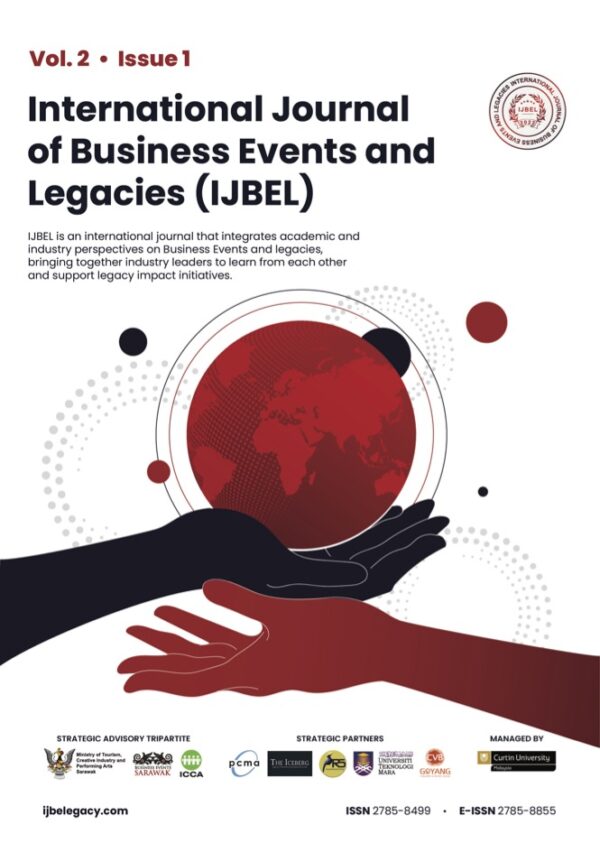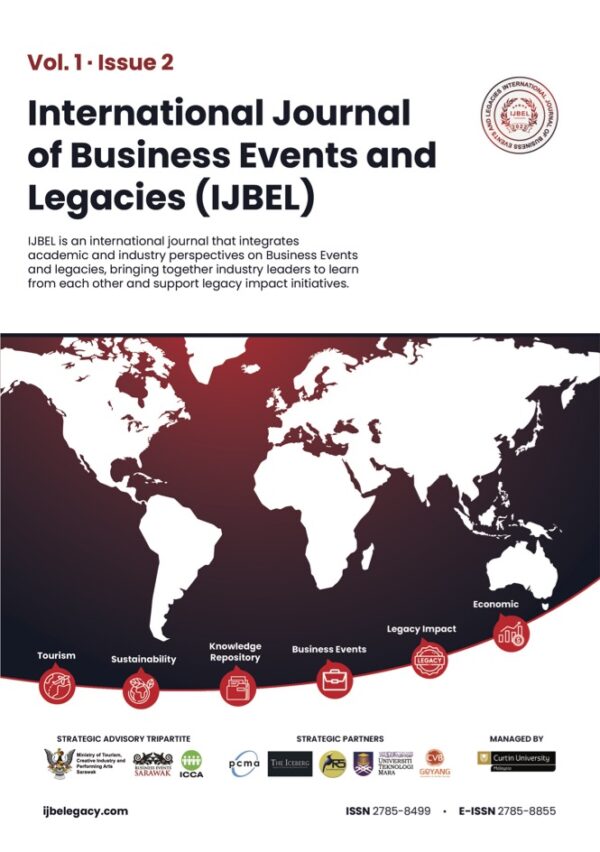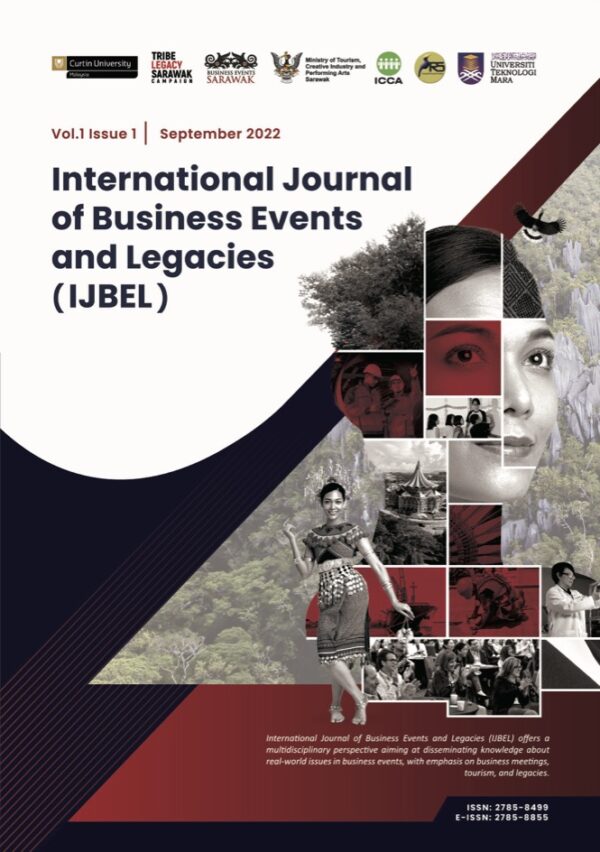Research Article
Jeff Wahl
Instructor Faculty of Global and Community Studies, School of Tourism Management, Capilano University
Kara Walker
Chair & Instructor, Faculty of Global and Community Studies, School of Outdoor Recreation Management, School of Tourism Management, Capilano University
ABSTRACT:
Conferences and exhibitions are important events that are associated with a range of positive impacts for attendees and other stakeholders on different scales. However, recent external disruptions such as COVID-19 and other global environmental and economic uncertainties have led to an increase in virtual and hybrid meetings. As virtual and hybrid events have increased, the ongoing value of in-person conferences and exhibitions has become less clear. This study explores the short-term outcomes and long-term legacies of five national and international conferences held in person at the Vancouver Convention Center, in Vancouver, British Columbia, Canada in 2022. The study also compares the outcomes of conferences that return to the destination annually and those that rotate globally. The analytical framework is informed by the outcome and legacy approach developed by the BestCities Global Alliance, and the United Nations Sustainable Development Goals. The study identifies 47 short-term outcomes and 17 long-term legacies; affirming the value of in-person conferences and conventions. Key outcomes for returning and globally rotating conferences are also identified, as well as suggestions to guide the management and study of conference outcomes and legacies in other contexts.
KEYWORDS: Conference, Exhibition, Meeting, Event, Legacy, Outcome, Impacts, Post-pandemic
Research Note
Andreas H. Zins
Curtin University Malaysia
Mair, Judith
University of Queensland, Australia
Ntounis, Nikolaos
Manchester Metropolitan University, UK
ABSTRACT:This research note offers an insightful analysis of a recent webinar featuring three editors-in-chief from distinct academic journals, specifically focusing on the theme of sustainability within the publishing industry. The webinar invited particular academics to discuss the role of business events. This article provides an in- depth look at the discourse shared during the webinar, highlighting how these leading figures articulate the role of academic publications in advancing sustainable practices. It extends to cover the diverse perspectives presented, the challenges discussed, and the strategies proposed for integrating sustainability more deeply into scholarly communication. It synthesizes the key points and thematic elements that emerged from the webinar, offering readers a comprehensive overview of the discussions and the broader implications for sustainability in academic publishing.
KEYWORDS: Sustainable Practices, Attendees, Networking, Scholarly Insights
Commentary Paper
Andreas H. Zins
Curtin University Malaysia
ABSTRACT: The article explores the intricate idea of “legacy” within the context of business events, highlighting its importance not just for individual events, but also for the lasting influence of an organization. Drawing insights from a study by Schot et al., (2023), and more recent critical voices (Lancaster, 2023; Latham, 2023) it underscores the importance of aligning associations’ missions with destinations’ marketing strategies. The role of destinations as enablers in the legacy-building process is highlighted, with a call to prioritize legacy discussions within associations. The article further explores Sarawak’s vision of becoming Borneo’s Legacy capital for business events, detailing legacy impact approaches in Copenhagen and Vancouver. Business Events Sarawak’s (BESarawak) commitment to fostering legacies is showcased through the BESLegacy framework, which aligns with Sarawak’s key areas and the UN’s Sustainable Development Goals (UN SDGs). Instruments like the Anak Sarawak Award and the Legacy Ambassador Programme are highlighted as tangible tools for recognizing legacy impacts. The article concludes with case studies of significant conferences and the contributions of individuals emphasizing the broader impacts of business events in Sarawak.
KEYWORDS: Legacy-building, Sustainable Development Goals, Anak Sarawak Award, Legacy Ambassador
Research Paper
Amélie van den Akker*a; Santusha Felipab; Merel Jansenc; Pia von Putbusd; Marleen Schuite
Hotel Management School Maastricht
ABSTRACT:In the evolving landscape of the meeting industry, particularly in the wake of the COVID-19 pandemic, understanding the future demand for external meeting venues has become crucial. This article delves into the findings of a comprehensive study conducted by the Hotel Management School Maastricht in collaboration with the International Association of Conference Centers (IACC). The research was driven by the need to identify current trends and factors influencing the demand for meeting venues in a decentralised work environment. To achieve this, a mixed-methods research approach was employed, encompassing both quantitative and qualitative methods. An online survey targeting high-level managers in large multinational companies was conducted to gather insights on their perspectives on the future usage of external meeting venues. Complementing this, semi-structured interviews were conducted with clients of IACC venues to delve deeper into specific needs and expectations for future business events. This article presents an analysis of these findings, offering a comprehensive view of the shifting dynamics in the meeting industry and providing actionable recommendations for stakeholders to adapt to these changes effectively.
KEYWORDS: Event Management, Business Conferences, Pandemic Impact, Industry Trends, Venue Analysis
Practitioner Report
Bettina Reventlow – Mourier
Copenhagen Convention Bureau / Copenhagen Legacy Lab Jens Degett, Scientific Journalist
ABSTRACT: This article represents Copenhagen Legacy Lab’s (CLL) strategic approach towards creating positive outcomes and long-term impacts from congresses and events. The website of CLL is an open-source platform for associations and industry professionals that showcases methods, tools, and materials including digital testimonials and case studies supporting prioritized strongholds of Copenhagen (‘Green Transition’, ‘Life Science, and IT Communications and Technology’). This article presents a case from all three strongholds that have applied CLL’s strategic and systematic approach towards legacy building. The aim of the approach is to identify a shared objective and inspire congresses and events to develop and commit to activities that potentially leave positive outcomes and long-term impacts. The activities will be evaluated based on inspiration from the Theory of Change and the EU Commission’s approach towards ‘Social Impact Measurement’.
KEYWORDS: Value Creation, Legacy, Impact
Mike Cannon
Owner, Mike Cannon Business Events – Asia Pacific (MCBE)
ABSTRACT: The paper is to provide a greater understanding of the bidding process to convention bureaux team members outside the field of bidding, allied supporters such as suppliers and government aka ministry, and students of business events (BE). The paper discusses about the bidding challenges, and importantly, the key benefits of winning the bid to the convention bureaux of the world, to society, and of course the community of a destination. The story is naturally bigger than this paper provides. For example, this study is developed from a 90-minute PowerPoint presentation and workshop developed by the author.
KEYWORDS: Business Events, ICCA, Tough Bid, Convention Bureau Environment, Sarawak Convention
Mike Cannon
Owner, Mike Cannon Business Events – Asia Pacific (MCBE)
ABSTRACT: The paper is to provide a greater understanding of the bidding process to convention bureaux team members outside the field of bidding, allied supporters such as suppliers and government aka ministry, and students of business events. The paper talks about the bidding challenges, and importantly, the key benefits of winning events such as these, to the convention bureaux of the world, to society, and of course the community of a destination. The story is naturally bigger than this paper provides. For example, this study is developed from a 90-minute PowerPoint presentation and workshop developed by the writer.
KEYWORDS: Business Events, ICCA, Tough Bid, Convention Bureau Environment, Sarawak Convention
Communication Brief
Mette Lindberg
CEO of UIA World Congress of Architects
ABSTRACT: The UIA World Congress of Architects 2023, held in Copenhagen, marked a pivotal moment in architectural history. Themed “Sustainable Futures – Leave No One Behind,” it attracted over 6,000 delegates from 135 countries. The event showcased innovative approaches to sustainable architecture, aligning with the United Nations’ 17 Sustainable Development Goals. A highlight was “The Copenhagen Lessons,” ten principles for sustainable development, emphasizing inclusivity, environmental responsibility, and resource efficiency. The congress fostered global collaboration among architects, researchers, and policymakers, highlighting the importance of stakeholder engagement, impact monitoring, and legacy building. It set a new standard for future architectural practices, emphasizing sustainable, equitable, and regenerative development. This congress is a crucial step towards a more sustainable architectural future, with its influence expected to resonate until the next congress in Barcelona in 2026 and beyond.
KEYWORDS: Green Building Principles, Urban Development Innovations, Architectural Sustainability, Global Architectural Collaboration, Environmental Design Strategies
Industry Viewpoint
Birgit Pacher*a; Christopher Roerigb;
Prof. Dr. Michael-Thaddaeus Schreiberc; Tilman, Naujoksd
Original whitepaper published by GCB German Convention Bureau
ABSTRACT: Moments when something new arises. Conferences, congresses, and events serve as platforms for exchanging experiences and ideas. They promote innovation, facilitate knowledge transfer, and further education and training. They foster international understanding. They reflect both international and national society and provide impetus for political, economic, scientific, and social processes. The event ecosystem also undergoes sustainable changes in response to global shifts that influence the conditions within which the industry operates. The innovation network Future Meeting Space (FMS) has been examining and discussing this continuous transformation since 2015. Based on this research, as well as other sources, the present white paper, considering all stakeholders in the event ecosystem, illustrates what a sustainable environment for business events might look like and the importance of these events for the development of regions and cities. It also analyzes the demands that business events place on destinations, locations, and the stakeholders involved today and even more so in the future, as well as the necessary conditions.
KEYWORDS: Innovation, Knowledge Transfer, International Understanding, Sustainable Environment




